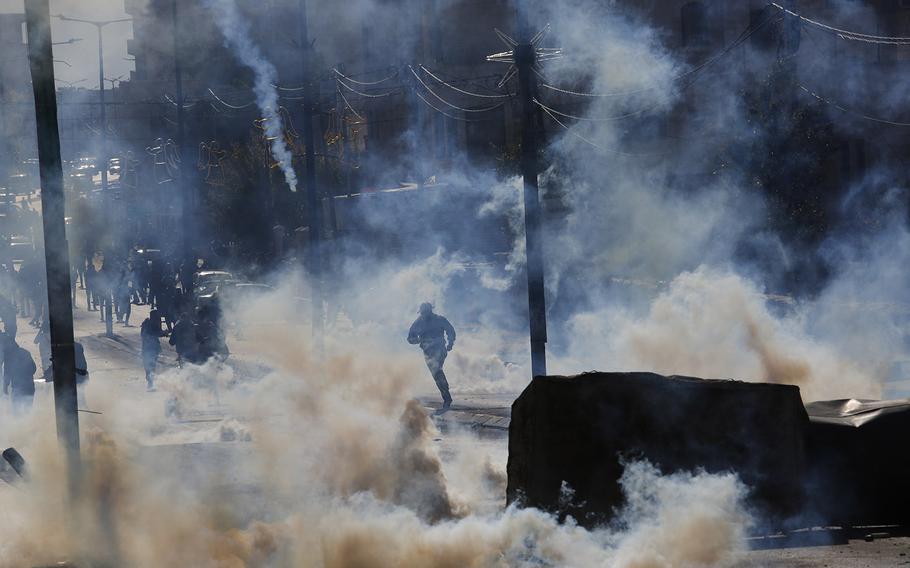
Palestinians clash with Israeli troops during a protest against U.S. President Donald Trump's decision to recognize Jerusalem as the capital of Israel in the West Bank city of Bethlehem, Saturday, Dec.9, 2017. (Nasser Shiyoukhi/AP)
MANAMA, Bahrain — Angst over the fallout from President Donald Trump’s decision to recognize Jerusalem as Israel’s capital dominated talks Saturday at a major security conference in Bahrain.
World leaders at the conference, hosted by the International Institute for Strategic Studies, also wrestled with a host of security challenges in a region vexed by proxy wars and insurgencies that have absorbed U.S. military attention for 16 years.
Among the concerns, hashed out by officials from Gulf states as well as Jordan, was Iran’s growing assertiveness beyond its borders in places such as Syria and Iraq.
Former CIA director and U.S. military commander David Petraeus called Syria “a geopolitical Chernobyl.”
“It is not entirely clear that Syria at this point can be put back together again,” Petraeus said.
Even with mounting concerns about Syria, Trump’s decision to recognize Jerusalem as Israel’s capital and relocate the American Embassy there took center stage at the conference. The move sparked dire forecasts from regional leaders about the long-term ramifications.
In Manama, there were no senior White House leaders on hand to explain the administration’s rationale, a factor that also fueled frustration.
“I think it is these (Jerusalem) issues that are a gift to radicalism,” said Anwar Gargash, United Arab Emirates foreign minister. “I am really, really surprised — the Americans have this wonderful platform here to explain the Jerusalem decision, and they are not here. This is another opportunity lost.”
Trump’s decision has riled some of the U.S.’s closest partners across the Middle East, including Jordan, whose top diplomat was briefly in Bahrain for talks before departing for an emergency meeting in Cairo on the Jerusalem matter.
Jordan Foreign Minister Ayman Safadi worried extremists will “exploit the feeling of injustice” among the Palestinians, increasing recruitment across the Middle East.
Prince Turki Al Faisal, a former Saudi ambassador to the U.S., also said anger over Trump’s decision will be used to recruit disenfranchised elements.
“This is going to give oxygen to the lost souls. They will become active again and will be very difficult to deal with,” Al Faisal said, adding the decision was “a step toward war.”
“There is no going back,” said Ibrahim Al Jaafari, Iraq’s minister of foreign affairs. “God knows what will be these repercussions.”
Officials in Bahrain, home the U.S. Navy’s 5th Fleet, expressed confusion and concern, but adopted a wait-and-see outlook. Bahrain Foreign Minister Khalid bin Ahmed Al Khalifa said the upshot is that Trump’s decision doesn’t rule out potential U.S.-backing for a two-state solution or the quest for east Jerusalem to be a Palestinian capital in the future.
“As a longtime friend and ally of the United States, we have never questioned the intentions of the United States toward the prosperity of our region,” Al Khalifa said.
Petraeus, who addressed the crowd in Bahrain, said opponents could use Trump’s Jerusalem decision to drive a wedge between the U.S. and its allies in the region. But the former U.S. Central Command leader also cautioned that the region faces graver problems.
“There are vastly more challenging and existential problems for countries in the region,” he said, citing pressing economic concerns, violent extremists and Iran.
Petraeus said in Iraq, where military leaders say the war with the Islamic State group is over after a long U.S.-backed campaign, sectarian competition continues to challenge security and efforts to form a stable government. Failure to bridge those divisions put the country at risk, he said.
“The battle after the battle in Iraq … may well prove more challenging then the defeat of ISIS,” Petraeus said.
U.S. Col. Joel Rayburn, who serves as the National Security Council’s director on Iraq and Syria, said a challenge in the region is keeping allies committed to the fight in those countries even though ISIS has been pushed from its stronghold. The lesson from the U.S. withdrawal from Iraq in 2010 is that a stabilization plan is needed to avoid losing security gains, he said.
The White House, Rayburn said, “understands this reality on the ground, and they have no intention of repeating the same mistake again.”
Pentagon officials have said they intend to keep U.S. forces in Iraq and Syria for the foreseeable future to reduce the risk of losing battlefield gains.
Petraeus, who led the 2007-08 surge in Iraq that helped briefly stabilize the country, argued in favor of the U.S. staying involved in far-flung places not only in Iraq but also in western Africa.
“We cannot drone strike or Delta Force our way out of this problem,” Petraeus said, citing the need for U.S. and allied trainers to build up indigenous forces in “ungoverned spaces.”
During the past year, the U.S. has built up counterterrorism forces in places such as Niger and Somalia, impoverished regions home to militants whose attacks so far have largely been contained to their respective regions. Critics argue the U.S. is over investing in fights that pose no direct threat to the U.S.
But Petraeus said Saturday that the effects of instability eventually ripple, citing a “tsunami of refugees” that have fled conflict zones in Syria and northern Africa.
“What happens there does not stay there,” Petraeus said.
Vandiver.john@stripes.com Twitter: @john_vandiver